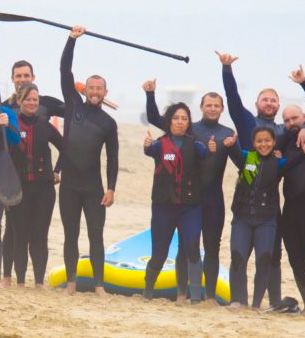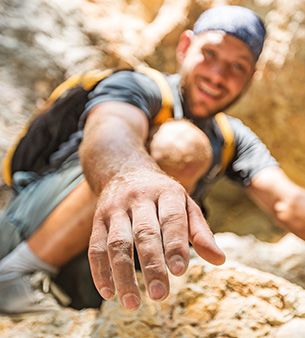About Experiential Programs
Coastline Rehab Centers offers a unique treatment modality to aid and enhance long-term recovery. This specialized service is our Experiential Therapy which is the pulse of the program.
The primary goals of Experiential Therapy are to connect physical and mental health, establish and improving teamwork skills, and fostering accountability and discipline. Our groups are designed to challenge and empower our clients. It is our role as facilitators to guide and support our clients as they develop skills that will aid them in their recovery as well as their lives. As we challenge them and expose them to trying situations it is imperative that we maintain our composure and our professionalism as we will be looked at as leaders and examples for our clients. Over time, we establish should a system of leaders who can overcome obstacles occurring in their day to day life.
Many of our clinicians and case managers are involved in creating and continuously growing the experiential therapy program. We are always searching for new techniques, activities, and methods that fit our client’s needs at any given time.


Coastline’s Unique Approach To Therapy
Though we have a basic foundation and curriculum for our experiential therapy treatment programs, we are continuously attempting to bring in the unique expertise of our clinicians and case managers to strengthen this program. Some have a proficiency in arts and creative writing while others are proficient in creating abstract games and obstacle courses. The differences and individual passions of our staff further enlivens and creates the uniqueness of the Coastline Experiential brand.

The Experiential Program is Divided Into Two Components
Outdoor – This component of our Experiential Therapy process includes outdoor activities specifically designed to create an atmosphere that necessitates teamwork developing a sense of brotherhood/sisterhood via supporting one another, learning to de-stress and decrease anxiety and frustrations. The heart of our physical activity is the water based activity – “supsquatch” where individuals are taken on raptors in groups of 6 with our experienced Activities Director paddling out to a short distance in the ocean. Games and activities are designed to encourage to promote team building, cooperation and problem-solving by having all participants work towards a shared goal.
In addition to the supsquatch, clients are taken on hikes in serene locations, engage in outdoor team sports and boot camps in sunny California. These activities we believe provide a sense of routine creates a sense of discipline and develops a sense of empathy as each team member is made to identify the contribution made by their teammates. Our experiential therapy experts work with clients to learn interpersonal skills by negotiating between identifying their own needs as well as the needs of the group as a whole. Overall, immersing our participants outdoors, in natural surroundings additionally cultivates a connection with themselves and mother nature. It opens them to spiritual experiences of uniting with a force greater than themselves.
Therapy Focused on Connecting Mind and Body
Indoor – This includes a variety of activities not limited to traditional “talk therapy” and basic psychoeducation. Though the two modalities are important, our belief is to go beyond these traditional methods of learning and provide training via real life learning and experience. By engaging other senses of sight, sound, vision, and touch, individuals are provided a hands-on experience that fortifies classroom concepts they were taught during an individual talk therapy session or via psycho-education. We attempt to engage these senses via role play, art activities, sand play, family sculpting and team enhancing games.
At Coastline, we have developed specific indoor team building activities to illuminate dysfunctional interpersonal relationships and provide healing. Some activities sensory deprivation. By shutting down the sense of sight, for example, team members typically feel uncomfortable with their physical well-being feeling compromised. They are then encouraged to rely on their teammates to accomplish their shared goal through a series of carefully strategized questions. These activities foster trust and provide a safe environment to share openly and honestly without feeling negatively evaluated or even pressured into sharing information personal to them. At the end of these activities, clients end up having a more wholesome experience where we have made a positive lasting impression. They learn life skills and coping skills to live independent fulfilling lives and become employable. As productive members of society, they now can give back to the community by helping fellow suffering addicts.
12 Step Programs and Experiential Therapy
All our experiential activities also tie into Alcoholics Anonymous. We build on the 12 steps, further emphasizing recovery, unity and being of service. We encourage a strong 12 step participation of building a fellowship with sober peers and finding a sponsor.
Due to our emphasis on teamwork and community support, we work closely with engaging our clients’ families from start to finish. We provide families weekly or biweekly updates of goals clients are working on, some brief struggles and solutions to the struggles as well as discharge planning. Our belief is, family involvement creates added accountability for our client which in turn further enriches the treatment process. Family involvement also alleviates feelings of isolation and fears our clients may carry especially coming to us from another state.


Words from one of our lead case managers…
“The greatest benefits of the experiential program which are basically a series of fun activities is working towards a common goal outside yourself and carry meaning and purpose for the recovery addict. Such fun activities reduce drug seeking and cravings. Hidden talents and skills that the client was previously unaware of, come to light. My idea of experiential is bringing common knowledge around a certain idea, for example, the meaning of honesty, build on the idea as a group to deepen understanding and out of that understanding, brainstorm practical application to real life. My whole philosophy is the more you dig deep into your personal insights and have the opportunity to have those insights tested in the real world, then you begin to use them as your own and they become a healthy part of your way of thinking and living. I like to create activities with small teams and fun competitions to generate dialogue, discussion, decision making, and action.”
David Demlie, MEd, CATC IV

